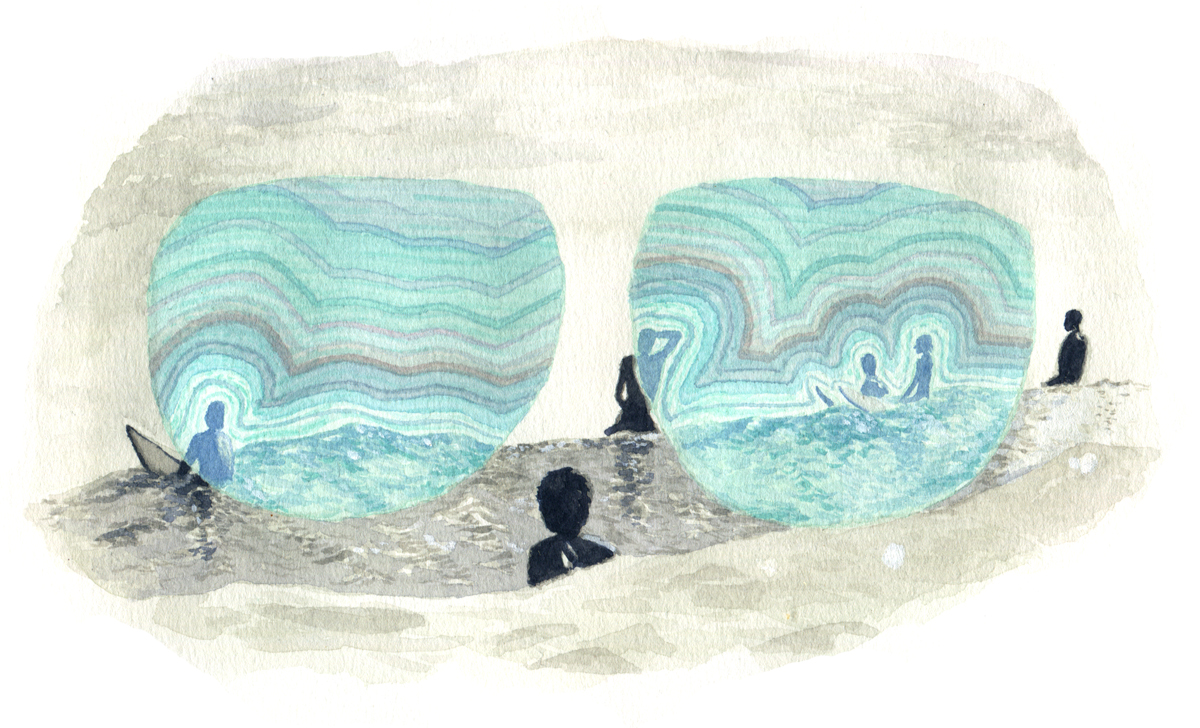
THE CLOTHES WE WEAR are functional objects that we spend most of our lives cloaked in, yet over time, we begin to develop relationships with these items that make them mean more than just the material. They whisper of our passions, our personal histories and our relationship with the physical spaces we inhabit, as well as of our own physicalities.
The last speaker in our ‘Speaking Dress’ series, Ryder Jones, who divides his time between the world of surfing and art in New Zealand, talks of the blue-lensed sunglasses he wears daily. Initially prescribed by his doctor to overcome pterygium, a biological response of light eyes to the sun, they have also become a focal point for his life in the water, and an emblem of stability in the nomadic world of surfing.
***
My mum got me these sunglasses for Christmas, but I picked them out.
They are a different shape from most sunglasses I’ve seen, but they’re not outrageous, they are slim and they have blue lenses. They make everything I look at blue, when I wear them the sky gets deeper and so does the ocean.
I wear blue most days; I keep falling back into this colour. I must be a blue kind of person, though not necessarily in the melancholic sense. My eyeballs are blue and they fry out in the sun, because of their lightness. There is a something that happens to ‘light eyes’ in the sun called pterygium.
My doctor said this word in Latin means third eyelid. It’s a tiny bit of flesh that creeps into your cornea, in an attempt to protect your eye from sun and saltwater damage. My doctor says I should wear sunglasses all the time outside. Basically your eye gets irritated, it’s not painful, but feels like when a piece of sand gets in your eye and it gets scratched and red.
I’ve been surfing for a pretty long time – mostly the men in my family surf. My dad got me into it when I was pretty young; probably six or seven. My dad used to put me on his board, and I would paddle out and sort of sit on his board when he caught waves. After a while, I figured out it was pretty fun, I got more into it. I was probably around seven when I caught my own wave.
When I go to check out the waves with my dad we always sit at this one bench. Before we get out of the car he says ‘the future’s so bright I gotta wear shades’, he says this a lot. I think he heard it on TV, but I’d like to think it is true.
Surfing for me is a solitary thing, or something I just do with my dad or my family. There are a lot less people who surf in New Zealand, than Hawaii or California (where I’ve lived) which is nice, as often I’m out there by myself or just with a couple of other guys. I read an article the other day I really liked – about your ‘lizard mind’, it was this one New Zealand surfer who talks about that when you go surfing, it triggers the combative part of your brain. When I wear the sunglasses, I feel incognito and anti-social, so I think the sunglasses tap into that.
A lot of my surfing equipment deteriorates after a certain amount of time – all of the things that I go swimming with either break or rust out, and my wetsuits burn through, especially in the winter when you’re surfing a lot. The little salt granules in the water are like tiny pieces of sandpaper and they tend to grate against things, and perish them. You don’t have a lot of things that last a long time when you surf, but my sunglasses are one thing that have lasted. They’re also a functional object for me and they stay exactly the same in the way that I imagine them. I think I’ve just grown closer to them, in the way that I appreciate more over time.
My parents and I have moved around quite a lot but it has always been orientated around the ocean. It’s something that is really embedded in my family, a tradition of organising ourselves around the ocean. The sunglasses land me back into blue. In all honesty, the sunglasses are important for me, but really they are a take-off point for speaking about something larger than that.
Shana Chandra is a New Zealand-based writer on fashion and culture.
Mark Hall-Patch is an illustrator and painter from Canada.